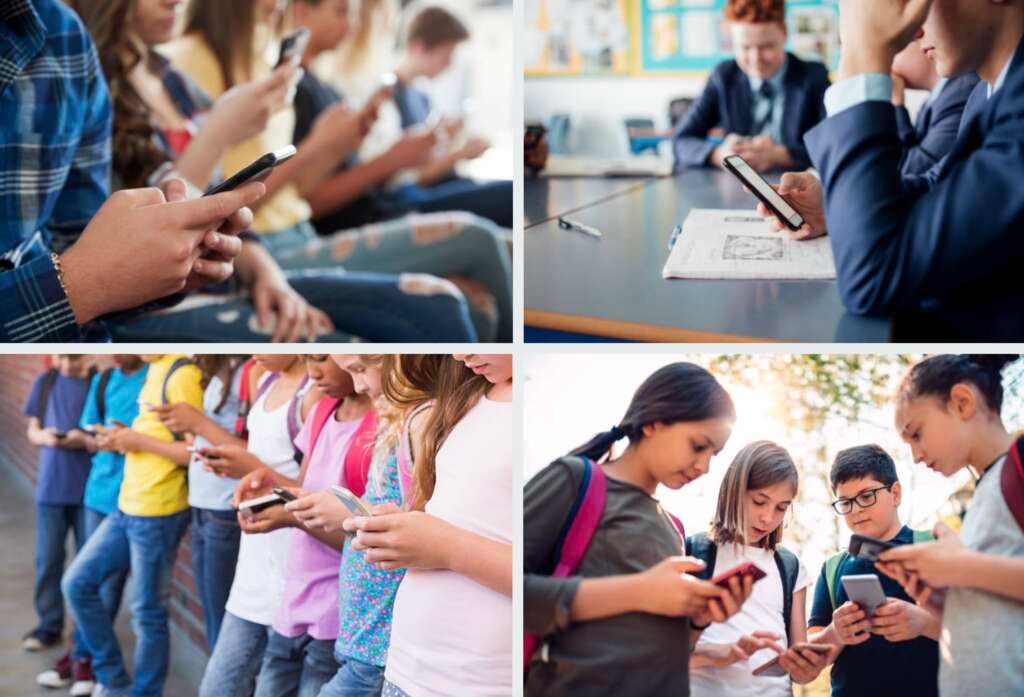Should cell phones be allowed in South African schools? Considering what current cell phones are capable of doing, there are many advantages of using cell phones in the school classroom(enhancing learning, staying up to date with the current knowledge, and more). However, there are also many disadvantages that accompany cellphones usage on the school premises. For a debate on mobile phones should not be allowed in school, this is the right content that can be used.
“Cellphones should not be allowed in schools because they are a distraction for students. I mean, let’s be real, the only thing kids are learning to do on their phones is how to type with their thumbs at lightning speed.”
20 Reasons Why Cell Phones Should Not be Allowed at Schools
Cell phones have become a ubiquitous part of modern life, and many students bring them to school with them every day. However, there are several reasons why cell phones should not be allowed in schools. Here are 20 reasons why cell phones should not be allowed at schools:
Distraction: Cell phones can be a major distraction for students, especially during class. Texting, playing games, and browsing social media can all take away from learning.
Cheating: Cell phones can also be used to cheat on tests and assignments. Students can easily use them to access answers or share answers with others.
Cyberbullying: Cell phones can be used to bully and harass other students, both in and out of school. This can have serious consequences for the mental health and well-being of the students involved.
Addiction: Cell phones can be addictive, and students who spend too much time on them can develop addiction-like symptoms.
Lack of social skills: Cell phones can also lead to a lack of social skills among students. They may become less able to communicate and interact with others in person.
Lack of physical activity: Cell phones can also discourage physical activity. Students who spend too much time on their phones may be less likely to participate in sports and other physical activities.
Lack of sleep: Cell phones can also disrupt sleep patterns, leading to lack of sleep and fatigue.
Lack of focus: Cell phones can also lead to a lack of focus among students. They may be less able to concentrate on their studies and other activities.
Privacy concerns: Cell phones can also raise privacy concerns. Students may be more likely to share personal information or engage in risky behavior if they have access to their phones.
Health concerns: Cell phones can also raise health concerns. They can cause eye strain, headaches, and other health problems.
Financial burden: Cell phones can also be a financial burden for families. Many students lose or break their phones, and families may have to pay to replace them.
Lack of respect for authority: Cell phones can also lead to a lack of respect for authority. Students may be less likely to follow rules and regulations if they have access to their phones.
Cybercrime: Cell phones can also be used to commit cybercrime. Students may use them to access illegal websites, engage in hacking, or steal personal information.
Disrespect for the learning environment: Cell phones can also lead to disrespect for the learning environment. Students may be less likely to take their studies seriously if they have access to their phones.
Lack of responsibility: Cell phones can also lead to a lack of responsibility among students. They may be less likely to take care of their phones and other personal belongings.
Lack of critical thinking: Cell phones can also lead to a lack of critical thinking among students. They may be less able to evaluate information and make informed decisions.
Lack of creativity: Cell phones can also lead to a lack of creativity among students. They may be less able to think outside of the box and come up with new and innovative ideas.
Lack of empathy: Cell phones can also lead to a lack of empathy among students. They may be less able to understand and relate to the feelings and experiences of others.
Lack of safety: Cell phones can also lead to a lack of safety. Students may be more likely to engage in risky behavior if they have access to their phones.
Lack of community: Cell phones can also lead to a lack of community among students. They may be less
5 FUNNY REASONS on Why Cell Phones Should Not be Allowed at Schools
Students might accidentally call their teacher “mom” or “dad” during class, leading to some awkward moments.
Students might become so obsessed with their phones that they start to see the world in pixelated form, unable to appreciate the beauty of the real world around them.
Students might start using their phones to order food delivery during class, leading to a wave of pizza deliveries to the school.
With the constant temptation of social media, students might start taking selfies during class and accidentally including their teacher in the background, causing some hilarious photobombs.
With access to GPS and navigation apps, students might start playing a game of “hide and seek” during lunchtime, using their phones to track each other down.
An Example of an Essay on “Mobile Phones should not be allowed in school.
Mobile phones should not be allowed in school:
Mobile phones have become an integral part of our daily lives. They provide us with a variety of functions, including communication, entertainment, and access to information. However, when it comes to schools, mobile phones should not be allowed.
One of the main reasons why mobile phones should not be allowed in schools is that they can be a major distraction for students. With access to the internet, social media, and games, it is easy for students to get caught up in their phones instead of paying attention to their studies. This can lead to poor academic performance and a lack of engagement in the classroom. Additionally, when mobile phones are allowed in schools, students may be tempted to use them to cheat on exams or assignments, which undermines the integrity of the education system.
Another reason why mobile phones should not be allowed in schools is that they can be a source of bullying and harassment. With the anonymity provided by mobile phones, students may feel emboldened to engage in cyberbullying, which can have serious consequences for the victims. Furthermore, mobile phones can also be used to share inappropriate images and videos, which can further contribute to a toxic school environment.
In addition, mobile phones can also be a security risk in schools. They can be used to take pictures and videos of sensitive information or even to plan or carry out malicious activities. Therefore, mobile phones should not be allowed in schools to ensure the safety of students and staff.
In conclusion, mobile phones should not be allowed in schools. They can be a major distraction for students, a source of bullying and harassment, and a security risk. Instead, schools should focus on creating a learning environment that is free from distractions and promotes academic excellence. This can be achieved through the implementation of strict mobile phone policies and the use of alternative forms of communication, such as school-provided email addresses or communication apps.

An Example of a No Cell Phone Policy at South African Schools
Cell Phone Policy for Learners
- Introduction: In today’s digital world, cell phones have become an important tool for communication, entertainment, and learning. However, in the school setting, cell phones can be a major distraction and can cause a number of problems. To promote a positive learning environment and to ensure the safety of our students, the school has implemented a no-cell phone policy for learners during school hours.
- Scope: This policy applies to all students in the school and covers the use of cell phones during school hours. School hours are defined as the time between the start of the school day and the end of the school day, including lunch and recess.
- Policy:
- Students are not allowed to use or have their cell phones on school grounds during school hours.
- Any student found with a cell phone during school hours will have the phone confiscated and will be subject to disciplinary action.
- If a student needs to contact a parent or guardian during school hours, they should do so through the school office.
- In cases of emergency, students may use their cell phones with the permission of a school administrator.
- Students are responsible for the safekeeping of their cell phones. The school will not be responsible for any lost or stolen cell phones.
- Consequences:
- First offense: Confiscation of the cell phone, parent/guardian notification, and detention.
- Second offense: Confiscation of the cell phone, parent/guardian notification, and suspension.
- Third offense: Confiscation of the cell phone, parent/guardian notification, and expulsion.
- Exceptions:
- Students who have an IEP or 504 plan that requires the use of a cell phone for communication purposes may be granted an exception to this policy. The student and the school administrator must develop a plan for the appropriate use of the cell phone in the classroom setting.
- Conclusion: The no-cell phone policy is intended to promote a positive learning environment and to ensure the safety of our students. We understand that cell phones are an important tool for communication and learning, but their use in the school setting can be disruptive. We ask for your cooperation in enforcing this policy, and we appreciate your support in helping to create a safe and productive learning environment for all students.

